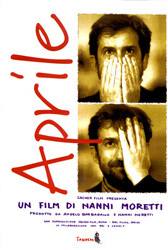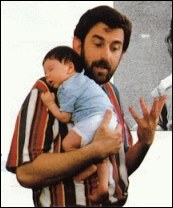|
|
||
 |
Italy,
1998. Unrated. 78 minutes.
Cast: Nanni Moretti, Silvio
Orlando, Daniele Luchetti, Andrea Molaioli, Agata Apicella Moretti,
Pietro Moretti, Silvia Nono, Nuria Schoenberg |
|
| Grade: B+ | Review by Jeff Vorndam |
![]() uick
quiz: name a charming Italian director and actor who is not above mugging
for the camera and casting his real-life wife in his films. If you said
"Roberto Benigni," try again (he's not charming).
Here's another question: name the self-absorbed writer-director whose
films (usually starring himself) are a diary of his insecurities about
sex, relationships, and politics. If you said "Woody Allen," you're wrong
(ixnay on the politics). The answer to both of these questions is Nanni
Moretti, the genial bearded director most recognized in the United States
for Caro Diario. His new film, Aprile, is a continuation
of the earlier film, as Moretti plays himself once more and turns his
real life tribulations into a celluloid document. If there's a theme running
through the movies I've seen so far at the San Francisco International
Film Festival, it's the blurring of the line between fiction and reality
(Close-Up and Wisconsin Death Trip are two other examples.)
I may have just turned off a number of people from this film by evoking
the image of a hybrid Benigni-Allen. Moretti is much more enjoyable than
that. I found Aprile an absolute delight,
and my only complaint is that it's too short.
uick
quiz: name a charming Italian director and actor who is not above mugging
for the camera and casting his real-life wife in his films. If you said
"Roberto Benigni," try again (he's not charming).
Here's another question: name the self-absorbed writer-director whose
films (usually starring himself) are a diary of his insecurities about
sex, relationships, and politics. If you said "Woody Allen," you're wrong
(ixnay on the politics). The answer to both of these questions is Nanni
Moretti, the genial bearded director most recognized in the United States
for Caro Diario. His new film, Aprile, is a continuation
of the earlier film, as Moretti plays himself once more and turns his
real life tribulations into a celluloid document. If there's a theme running
through the movies I've seen so far at the San Francisco International
Film Festival, it's the blurring of the line between fiction and reality
(Close-Up and Wisconsin Death Trip are two other examples.)
I may have just turned off a number of people from this film by evoking
the image of a hybrid Benigni-Allen. Moretti is much more enjoyable than
that. I found Aprile an absolute delight,
and my only complaint is that it's too short. 
Aprile is a product born of Moretti's own indecision. He made the film up as he went along and took three years to complete it. Moretti would write scenes the day before he shot them. His entire cast play themselves, and his shooting schedule depended on their daily schedules. The film begins in Italy in 1994, with the electoral victory of a right-wing political coalition. Moretti, an unabashed liberal, is despondent. He determines to make a documentary about the administration and the next electoral campaign, one that will expose the Right as dangerous and lampoon the Left for being complacent. He speaks loudly and at length to anyone who will listen that this is his civic duty, and that the film will be a document of Italy today. But Moretti has other things going on in his life that keep halting his production of this important documentary. One of them is a musical that he has long wanted to make about a Trotskyite chef. While he's supposed to be researching and organizing his hard-hitting documentary exposé, Moretti finds himself dreaming about the musical and how much more fun and artistically satisfying it would be. There is conflict between art and political imperative in Moretti's world. It's an impasse he must confront–is public duty more important than personal indulgences?
Distracting Moretti even more is the incipient birth of his son. There
are many warmly funny scenes with Moretti and his wife Daniela as they
try to narrow down names for their child and their parents compete to
buy cuter clothes for the infant. These are slice-of-life vignettes that
give you a good feel for Moretti as a person and what it would be like
to spend some time with him. He and wife go to the movies a lot. The time
is now 1995, and they discuss the latest films like Heat and Dead
Man Walking. The funniest scene in the film takes place after
they see Strange Days and Moretti worries whether mindless Hollywood
garbage is having deleterious effects on his pre-natal son. Eventually
his son his born, and Moretti is more wrapped up in his family than his
work, postponing the documentary until the next election. There's a curious
duality going on here as both the film and the events depicted
in the film reveal an extremely self-indulgent man who believes everyone
else should be as interested in himself as he is. It's Moretti's saving
grace that he is charismatic and unafraid to depict himself as foolish
and occasionally abrasive. He doesn't demand our love, just our attention.
The mixture of political and personal in Aprile ends up serving the purpose of Moretti's documentary. It illuminates a contradictory time in Italy, the country that has spawned both Michelangelo and Mussolini. Every place Moretti zips by on his little Vespa is a beautiful mix of the old and the modern, and his personal life is struggle between the carefree career-indulgence of his youth and the responsibilities of a father and husband. The key moment in the film is an exuberant expression of the joy of realizing that you can and should do only what you really like. When a friend points out that Moretti's remaining life, as measured on a ruler, is the short end of the stick, Moretti gets on his Vespa and rides through town throwing out the material on the documentary that he had felt compelled to make.
The film's 78 minutes go by all too quickly. Its brevity almost makes the film too light. When it concluded, I was smiling and bopping along to the music, almost unaware that any time had passed. It's been two years since Aprile was released but it still hasn't found U.S. distribution. With any luck, it will make it onto video soon. Indulge yourself, and seek it out.
Review
© April 2000 by AboutFilm.Com and the author.
Images © 1998
Tandem Films. All Rights Reserved.
 |
|